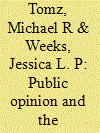| Srl | Item |
| 1 |
ID:
174460


|
|
|
|
|
| Summary/Abstract |
Foreign electoral intervention is an increasingly important tool for influencing politics in other countries, yet we know little about when citizens would tolerate or condemn foreign efforts to sway elections. In this article, we use experiments to study American public reactions to revelations of foreign electoral intervention. We find that even modest forms of intervention polarize the public along partisan lines. Americans are more likely to condemn foreign involvement, lose faith in democracy, and seek retaliation when a foreign power sides with the opposition, than when a foreign power aids their own party. At the same time, Americans reject military responses to electoral attacks on the United States, even when their own political party is targeted. Our findings suggest that electoral interference can divide and weaken an adversary without provoking the level of public demand for retaliation typically triggered by conventional military attacks.
|
|
|
|
|
|
|
|
|
|
|
|
|
|
|
|
| 2 |
ID:
127837


|
|
|
|
|
| Publication |
2013.
|
| Summary/Abstract |
One of the most striking findings in political science is the democratic peace: the absence of war between democracies. Some authors attempt to explain this phenomenon by highlighting the role of public opinion. They observe that democratic leaders are beholden to voters and argue that voters oppose war because of its human and financial costs. This logic predicts that democracies should behave peacefully in general, but history shows that democracies avoid war primarily in their relations with other democracies. In this article we investigate not whether democratic publics are averse to war in general, but whether they are especially reluctant to fight other democracies. We embedded experiments in public opinion polls in the United States and the United Kingdom and found that individuals are substantially less supportive of military strikes against democracies than against otherwise identical autocracies. Moreover, our experiments suggest that shared democracy pacifies the public primarily by changing perceptions of threat and morality, not by raising expectations of costs or failure. These findings shed light on a debate of enduring importance to scholars and policy makers.
|
|
|
|
|
|
|
|
|
|
|
|
|
|
|
|